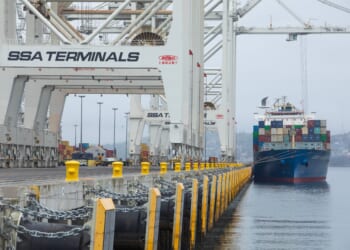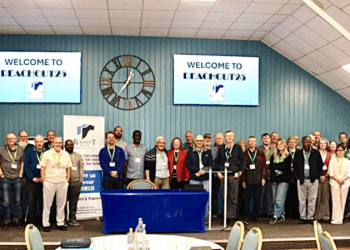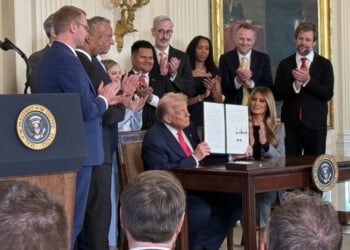Harry Curtis is East of England Young Conservative Chairman.
Kemi Badenoch’s conference announcement of the golden rule and £48 billion cuts to public spending was a step in the right direction, but it is simply not enough. We must be bolder and more creative with our economic vision for Britain.
The Labour government has hiked taxes and borrowing to post-war highs, with another budget on the way to hit working people and small businesses with more tax rises. This government are killing the economy, dragging Britain, kicking and screaming, down the road to serfdom. Only the Conservative Party can pull Britain back from the edge of economic doom.
Britain, burdened by debt and spending commitments, currently faces a £9 trillion gap in public finances. Most of this debt has arisen from liabilities related to the state pension. We are at a crucial turning point in the legacy of the post-war consensus; our public welfare system is broken, based on an outdated model designed for a post-war Britain, now unrecognisable to modern society. The consequences are clear. Our welfare system no longer serves its purpose, and we need to reform it for the sake of our future generations by reducing its scope and reallocating funds into cuts to corporation and income tax.
The Conservative Party must channel Margaret Thatcher, on the 100th year since her birth, and be bold and address the causes of our economic decline at its roots, by scrapping the state pension for everyone born tomorrow and completely revamping unemployment benefits to be time-limited, with an emphasis on addressing voluntary economic inactivity. We need to reduce welfare only to support the most vulnerable in society. The savings from these changes should be used to lower taxes for businesses and workers by raising the personal income tax allowance and broadening income and corporation tax brackets.
This approach aims to create an economic environment that reduces welfare dependency and increases employment, which then fuels economic growth. Additionally, this strategy tackles migration issues by lowering the financial burden on low-skilled workers and expanding job opportunities for British citizens through SMEs (such as admin, retail, and warehouse roles) and vocational sectors like construction, health, and social care, which will grow if the economy improves. As a result, we can become less dependent on low-skilled migration, which generally costs taxpayers more than it benefits. Ultimately, building a sustainable economy will allow all individuals, regardless of their employment type, to have the opportunity to thrive.
However, this must begin early in life; the state should overhaul how it educates its citizens, remove taxes of envy on private education and SEN schools to prevent our state schools and academies from becoming over-subscribed, and invest more in apprenticeships and low-skilled qualifications. Furthermore, 42 per cent of university graduates in Britain are employed in jobs that do not require their degree. We need to stop selling students the Blairite dream that a university degree guarantees a lucrative career.
Financial giants like JP Morgan and Goldman Sachs are expanding their apprenticeships, as are leading legal firms such as Slaughter and May. This represents the future of education – apprenticeships across all sectors of the economy. If we become more inventive, if we just act bolder on our principles of small-state, market-led economics, we can build a self-reliant economy that fosters aspiration and diligence in every field of employment. Abolish low-outcome degrees, eliminate the mountain of debt for the 42 per cent, and reinvest the savings into apprenticeships and vocational training.
Following this approach, we can unlock the potential of SMEs, the backbone of our economy and the most important contributors to employment, which the state has failed the most. When we return to government, creating a budget specifically aimed at reducing the tax burden on SMES should be a top priority. One way to address this issue could be at the local government level, particularly with small hospitality businesses.
Despite paying for private industrial bin collections, these businesses still must pay for local government services they do not utilise and face ever-increasing business rates. This forces SMES to either raise their prices or significantly cut into their overheads, especially when combined with Labour’s employer NIC increases. The conditions for success are narrowing before they even get started. This isn’t a free market; we need to create the right conditions for SMES to thrive. If they operate under low taxes and receive good value services but still fail, that is a sign of a dynamic, free economy.
We’ve spent our way into this mess, and we can’t spend our way out of it. Britain needs to think boldly. The Conservative Party has celebrated the 100th birthday of Thatcher. Still, now we must honour her legacy, honour her vision for Britain by presenting a daring economic plan to voters in 2029 that ends our dependence on migration, encourages aspiration through employment, and creates the conditions for success. The road home to government is clear: dominate the economic debate with a bold and daring plan to persuade voters that the Conservative Party is the only party capable of truly fixing the economy.











![Trump, Hegseth to Get Troops Paid Despite Dems Voting Against it Eight Times [WATCH]](https://www.right2024.com/wp-content/uploads/2025/10/Trump-Hegseth-to-Get-Troops-Paid-Despite-Dems-Voting-Against-350x250.jpg)





